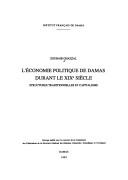| Listing 1 - 8 of 8 |
Sort by
|
Multi
ISSN: 22257578 ISBN: 9782351597101 2351597109 2351598024 Year: 2015 Volume: 38 Publisher: Beyrouth: Presses de l'Ifpo,
Abstract | Keywords | Export | Availability | Bookmark
 Loading...
Loading...Choose an application
- Reference Manager
- EndNote
- RefWorks (Direct export to RefWorks)
Cette étude nous livre une occasion unique de brosser un portrait fort complexe de la société syrienne contemporaine telle qu’elle transparaît à travers les archives criminelles d’avant la guerre civile de 2011. L’auteur a pu avoir accès à de nombreux dossiers d’Alep et d’Idlib, en plus d’entretiens extensifs avec des avocats, des juges et d’autres experts, et avec des détenus accusés de crimes contre la société ; l’auteur rend compte ici avec acuité des années des deux régimes de Ḥāfiẓ et Bashshār al-Asad. This book gives a unique portrait of Syrian society through the workings of its criminal records in the three decades prior to outbreak of the civil war in 2011. Based on actual crime files from Aleppo and Idlib, in addition to extensive interviews with criminal detainees, lawyers, judges, and court experts, this study manages an in-depth account of Syria under the Baathist rule of the two Asad régimes.
Political crimes and offenses --- Subversive activities --- Prisoners --- Investigation --- History --- Legal status, laws, etc. --- International Relations --- justice --- criminalité --- criminels --- procès --- juges --- avocats --- Baath (parti) --- tribunaux --- archives --- criminals --- prosecution --- justice court --- judges --- lawyers --- Syria --- criminality --- archive
Book
ISBN: 235159052X 282181559X 2351592697 Year: 2007 Publisher: Presses de l’Ifpo
Abstract | Keywords | Export | Availability | Bookmark
 Loading...
Loading...Choose an application
- Reference Manager
- EndNote
- RefWorks (Direct export to RefWorks)
Most studies on Islamic, Arab and Ottoman societies are content with the role of testimony that texts available to researchers can play, thus reducing the role of text and language to a mimetic description of past events. The point here is to show that any understanding of social relations implies, first, to consider the textual production of a society by questioning the meaning assignable to the texts themselves. It also supposes that the analysis of texts, whatever their societal and institutional context, must consider its sources as discursive practices, in order not to reduce them to their preliminary function of factual testimony. Drawing on a wide variety of Ottoman "legal" texts produced in Beirut and Damascus in the 19th century, this book avoids linking these texts to the normative values of “Islamic law”, but on the contrary documents the way in which discursive practices operate concretely on a specific terrain. Different levels of practices then emerge, all documented by the social actors who made their very existence possible.
Judicial process (Islamic law) --- Procedure (Islamic law) --- Evidence, Documentary (Islamic law) --- Law, Politics & Government --- Canon Law --- Islamic law --- droit islamique --- économie --- waqf --- justice --- droit

ISBN: 2901315038 Year: 1993 Publisher: Damas Institut français de Damas
Abstract | Keywords | Export | Availability | Bookmark
 Loading...
Loading...Choose an application
- Reference Manager
- EndNote
- RefWorks (Direct export to RefWorks)
Article
Abstract | Keywords | Export | Availability | Bookmark
 Loading...
Loading...Choose an application
- Reference Manager
- EndNote
- RefWorks (Direct export to RefWorks)
Digital
ISBN: 9782351592694 Year: 2007 Publisher: Beyrouth Institut français du Proche-Orient
Abstract | Keywords | Export | Availability | Bookmark
 Loading...
Loading...Choose an application
- Reference Manager
- EndNote
- RefWorks (Direct export to RefWorks)
Book

ISBN: 2362450724 Year: 2018 Publisher: Istanbul : Institut français d’études anatoliennes,
Abstract | Keywords | Export | Availability | Bookmark
 Loading...
Loading...Choose an application
- Reference Manager
- EndNote
- RefWorks (Direct export to RefWorks)
The articles forming the present volume aim to contribute to the rich and evolving historiography on the multiplicity of the actors and the institutions of Ottoman legal system. As the title of the volume suggests, “forms” and “institutions” of justice are a common thread in the contributions. Each article concentrates on a specific historical moment and context in order to chart the articulation of different forms of Ottoman justice. This volume has emerged as an outcome of a workshop organized at the French Institute of Anatolian Studies (IFEA) on January 6-7, 2012, in Istanbul. At the outset we grappled with the following question: What were the multiple actors and normative sources that enabled the historians to talk about ‘justice’ across different cultural and historical geographies under the rule of the Ottoman dynasty? Our concern was in part to question the unitary conception of an ‘Ottoman Justice’ and the legal and procedural dominance accorded the kadi in Ottoman historiography.
Book

ISBN: 9781501718694 Year: 2018 Publisher: Ithaca, NY
Abstract | Keywords | Export | Availability | Bookmark
 Loading...
Loading...Choose an application
- Reference Manager
- EndNote
- RefWorks (Direct export to RefWorks)
Multi

ISBN: 9781501718694 Year: 2018 Publisher: Ithaca, N.Y. Cornell University Press
Abstract | Keywords | Export | Availability | Bookmark
 Loading...
Loading...Choose an application
- Reference Manager
- EndNote
- RefWorks (Direct export to RefWorks)
| Listing 1 - 8 of 8 |
Sort by
|

 Search
Search Feedback
Feedback About UniCat
About UniCat  Help
Help News
News